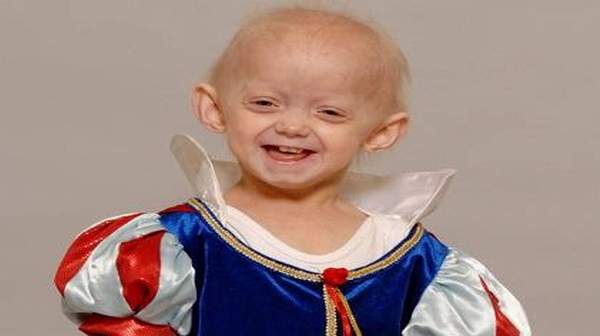Progeria is a rare, fatal genetic condition that produces rapid aging in children. Affected children typically look normal at birth and in early infancy, but then grow more slowly than other children and do not gain weight at the expected rate. Most kids with progeria do not live past the age of 13. The disease affects both sexes and all races equally. It affects about 1 in every 4 million births worldwide. A single mistake in a certain gene causes it to make an abnormal protein. When cells use this protein, called progerin, they break down more easily. Progerin builds up in many cells of kids with progeria, causing them to grow old quickly. This condition does not disrupt intellectual development or the development of motor skills such as sitting, standing, and walking.
Causes
Researchers have discovered a single gene mutation responsible for progeria. The gene, known as lamin A (LMNA), makes a protein necessary for holding the center (nucleus) of a cell together. When this gene has a defect, researchers believe the genetic mutation makes cells unstable, which appears to lead to progeria’s aging process.
Unlike many genetic mutations, progeria isn’t passed down in families. Rather, the gene change is a chance occurrence that researchers believe affects a single sperm or egg just before conception. Neither parent is a carrier, so the mutations in the child’s genes are new (de novo).
Other similar syndromes
There are, however, other progeroid syndromes that run in families. These inherited syndromes cause rapid aging and shortened life span:
- Wiedemann-Rautenstrauch syndrome, also known as neonatal progeroid syndrome, starts in the womb, with signs and symptoms of aging apparent at birth.
- Werner syndrome begins in the teen years or early adulthood, causing premature aging and conditions typical of old age, such as cataracts and diabetes.
Symptoms
Most kids with progeria look healthy when they’re born, but they start to show signs of the disease during their first year. Babies with progeria do not grow or gain weight normally. They develop physical traits including:
- A bigger head
- Large eyes
- A small lower jaw
- A thin nose with a “beaked” tip
- Ears that stick out
- Veins you can see
- Slow and abnormal tooth growth
- A high-pitched voice
- Loss of body fat and muscle
- Hair loss, including eyelashes and eyebrows
As children with progeria get older, they get diseases you’d expect to see in people age 50 and older, including bone loss, hardening of the arteries, and heart disease. Children with progeria usually die of heart attacks or strokes.
Exams and Tests
The health care provider will perform a physical exam and order laboratory tests. This may show:
- Insulin resistance
- Skin changes similar to that seen in scleroderma (the connective tissue becomes tough and hardened)
- Generally normal cholesterol and triglyceride levels
- Cardiac stress testing may reveal signs of early atherosclerosis of blood vessels.
Genetic testing can detect changes in the gene (LMNA) that causes progeria.
Treatments
At this time, there’s no cure for progeria, but researchers are working on finding one. A kind of cancer drug, FTIs (farnesyltransferase inhibitors), may fix the damaged cells.
Treatments usually help ease or delay some of the disease’s symptoms.
- Medication. Your child’s doctor may prescribe drugs to lower cholesterol or prevent blood clots. A low dose of aspirin every day can help prevent heart attacks and stroke. Growth hormone can help build height and weight.
- Physical and occupational therapy can help your child keep moving if they have stiff joints or hip problems.
- Surgery. Some children may have coronary bypass surgery or angioplasty to slow the progression of heart disease.
- At home. Kids with progeria are more likely to get dehydrated, so they need to drink plenty of water, especially when they’re sick or it’s hot. Small meals more often can help them eat enough, too. Cushioned shoes or inserts can ease discomfort and encourage your child to play and stay active.
Prognosis
Progeria causes early death. Patients usually only live to their teenage years (average lifespan of 13 years). However, some patients can live into their early 20s. The cause of death is usually related to the heart or a stroke.





